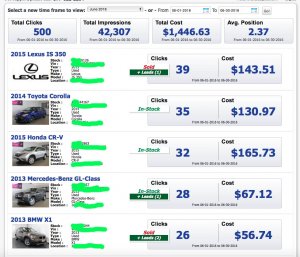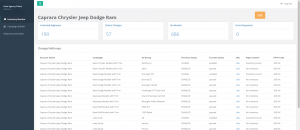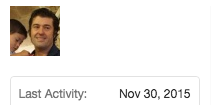You are using an out of date browser. It may not display this or other websites correctly.
You should upgrade or use an alternative browser.
You should upgrade or use an alternative browser.
Google Adwords Deep Linking VDPs In-House
- Thread starter Nick Spolec
- Start date
- Oct 28, 2012
- 410
- 280
- Awards
- 5
- First Name
- Chris K
- Dec 30, 2009
- 1,883
- 480
- First Name
- Yago
Ok ok I'm back. Had to leave this party for a while and get some real work done. 
I didn't want to go there because I felt that this is "advertising" my tool, however I will say that I truly have better found a way to promote sales for our $250 dynamic PPC tool than here at the forums! So with that being said I'll share what I've learned on this.
The tool, which we call 'dynamic PPC' (we are pretty Spartan with names around here) is simple on what it does:
We get a feed from your inventory provider and based on that;
It looks at the inventory and creates 10 ads per car based on the content in the feed. So for example it will create an add that focuses on 'model + color' matching and another one that focuses on 'model + unique' options matching and so forth. We thought that this will give us a better matching percentage with longer tail searches.
All the ads are linked straight to the VDP unless we have more than--I think it is 3--matches and in that case we link to an SRP with those 3 matches. For example this is useful for Toyota dealers with lots of '14 used Corollas in inventory.
In my experience, new car campaigns have been kind of disappointing. This could also be that we have never ran campaigns on successful new cars; let me explain. Dealers selling a lot of new cars--called high volume low profit--are never interested on spending money, they already sell cars what they need is to figure out how to contain expenses. Then we have dealers with low volume like... Infiniti for example. Willing to spend some money on those 2 individuals in their market looking for a brand new Infiniti.
We were a little bit more successful when we combined new car dynamic campaigns with lease payments, however we only do this for dealers that are fairly involved on PPC in general (meaning they have lots of other campaigns so they have specials, good pricing, etc).
Used cars work just fine, pricing is close to that regular PPC is in most markets. The attached screenshot is a luxury brand in the Seattle metro market. You judge the cost in comparison with your own market.
As a warning; you should do dynamic PPC if:
1) You have a small budget and just need to get some VDP views in your very aggressively priced used cars.
2) You have a good idea about PPC and already do a lot of other things, this is just extending your reach into searches.
You shouldn't do this if:
1) Your used car sales are slow and you are looking for the one solution to change the month.
2) You want to fire a 3rd party provider and replace it with this newfound magic tool.


I didn't want to go there because I felt that this is "advertising" my tool, however I will say that I truly have better found a way to promote sales for our $250 dynamic PPC tool than here at the forums! So with that being said I'll share what I've learned on this.
The tool, which we call 'dynamic PPC' (we are pretty Spartan with names around here) is simple on what it does:
We get a feed from your inventory provider and based on that;
It looks at the inventory and creates 10 ads per car based on the content in the feed. So for example it will create an add that focuses on 'model + color' matching and another one that focuses on 'model + unique' options matching and so forth. We thought that this will give us a better matching percentage with longer tail searches.
All the ads are linked straight to the VDP unless we have more than--I think it is 3--matches and in that case we link to an SRP with those 3 matches. For example this is useful for Toyota dealers with lots of '14 used Corollas in inventory.
In my experience, new car campaigns have been kind of disappointing. This could also be that we have never ran campaigns on successful new cars; let me explain. Dealers selling a lot of new cars--called high volume low profit--are never interested on spending money, they already sell cars what they need is to figure out how to contain expenses. Then we have dealers with low volume like... Infiniti for example. Willing to spend some money on those 2 individuals in their market looking for a brand new Infiniti.
We were a little bit more successful when we combined new car dynamic campaigns with lease payments, however we only do this for dealers that are fairly involved on PPC in general (meaning they have lots of other campaigns so they have specials, good pricing, etc).
Used cars work just fine, pricing is close to that regular PPC is in most markets. The attached screenshot is a luxury brand in the Seattle metro market. You judge the cost in comparison with your own market.
As a warning; you should do dynamic PPC if:
1) You have a small budget and just need to get some VDP views in your very aggressively priced used cars.
2) You have a good idea about PPC and already do a lot of other things, this is just extending your reach into searches.
You shouldn't do this if:
1) Your used car sales are slow and you are looking for the one solution to change the month.
2) You want to fire a 3rd party provider and replace it with this newfound magic tool.

- Jan 28, 2017
- 10
- 6
- First Name
- Miles
Hey everyone! Anyone out there doing Adwords direct to VDPs in-house? I am looking to start doing select vehicles form our used inventory. Just want to know if there is any advice on proceeding.
Thanks!
I struggled with integrating vehicle inventory with AdWords campaigns for years. I built three different integration tools prior to the software we now sell. In 2016, we finally figured out how to make this easy and affordable. We can now integrate a dealer's vehicle inventory with AdWords in under 15 minutes, and it only costs $50. No data feed required. No, I'm not joking. You say "go", and 15 minutes later your AdWords account is integrated with vehicle inventory. How? We programatically extract inventory data from the dealer's website. An oversimplified explanation, to say the least. But that's how we do it, and it has solved all our previous challenges.
- Dec 30, 2009
- 1,883
- 480
- First Name
- Yago
I struggled with integrating vehicle inventory with AdWords campaigns for years. I built three different integration tools prior to the software we now sell. In 2016, we finally figured out how to make this easy and affordable. We can now integrate a dealer's vehicle inventory with AdWords in under 15 minutes, and it only costs $50. No data feed required. No, I'm not joking. You say "go", and 15 minutes later your AdWords account is integrated with vehicle inventory. How? We programatically extract inventory data from the dealer's website. An oversimplified explanation, to say the least. But that's how we do it, and it has solved all our previous challenges.
Miles,
So you crawl the dealer's website for URLs?
What kind of back end/mods/reporting tool do you offer?
- Jan 28, 2017
- 10
- 6
- First Name
- Miles
Yup. We pull down every ad in the dealer AdWords account and click on them (programatically). If the ad lands on a "no results" page, the associated ad group is paused. If the ad lands on a successful search results page, the associated ad group is enabled. This simple approach has solved so many problems that we used to have with data feeds.
It's a little more complicated how we crawl for count & min price for ad customizers. And even more complicated for integrating inventory for dynamic Facebook and AdWords remarketing campaigns. But it is all done by crawling the dealer websites and can be setup extremely quickly.
Pasting a screenshot of the reporting interface.

It's a little more complicated how we crawl for count & min price for ad customizers. And even more complicated for integrating inventory for dynamic Facebook and AdWords remarketing campaigns. But it is all done by crawling the dealer websites and can be setup extremely quickly.
Pasting a screenshot of the reporting interface.

I feel like feeds are much easier to work with and far less taxing to scale.
Our sites don't remove sold vehicles, they simply mark them as sold, so your links would never 404 or bounce back in that case, they would still load the sold vehicle.
Once feeds are setup properly they work great and we can also pull other fairly accurate stats like date added, date sold, price changes, etc.
Are you re-scraping for new photos and prices every day? Can be solved with a simple checksum on the feed instead.
I like your versatility, but I'd cringe to see that scale.
Our sites don't remove sold vehicles, they simply mark them as sold, so your links would never 404 or bounce back in that case, they would still load the sold vehicle.
Once feeds are setup properly they work great and we can also pull other fairly accurate stats like date added, date sold, price changes, etc.
Are you re-scraping for new photos and prices every day? Can be solved with a simple checksum on the feed instead.
I like your versatility, but I'd cringe to see that scale.
- Jan 28, 2017
- 10
- 6
- First Name
- Miles
We actually have a way to deal with sites that show vehicles even when the intended vehicle is not in inventory. Scalability for this kind of tool is certainly not for the casual programmer. You could not build this in-house. The concept is simple, but the development is far more difficult than pulling a data feed from a ftp location. Scalability challenges are just the tip of the iceberg. But we jumped over all these hurdles long ago. Google has certainly proven that web crawling/indexing software can be highly scalable. We have no problems with scale.










